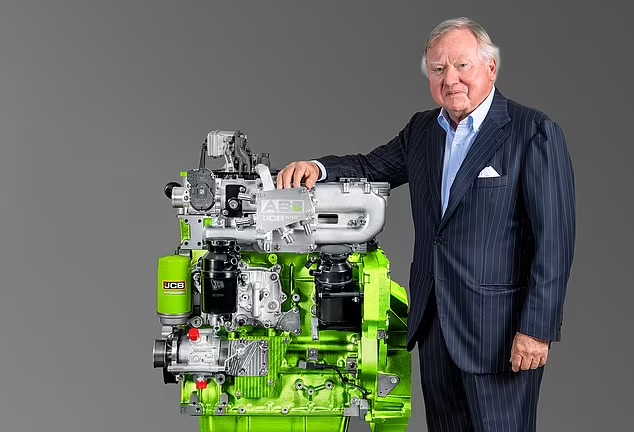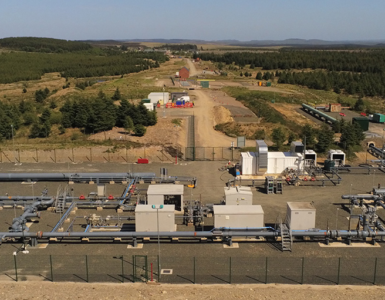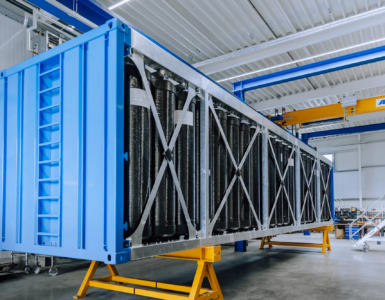We’re using hydrogen to power our big machines and it’s a revelation, says JCB boss LORD BAMFORD.
Let’s face it. Whether we like it or not, the future for cars in this country is electric. In little more than a decade, following a Government mandate, motorists effectively will have only one choice: cars powered by electric batteries.
Hybrid cars are an option now, but sales of new hybrid cars will be banned from 2035.
I can’t help wondering if things might have been different. Because in the ‘off-highway’ industry in which JCB operates – that is, not on the road – we will still have a choice: between battery-electric technology and hydrogen.
🔥 What about we co-host a webinar? Let's educate, captivate, and convert the hydrogen economy!
Hydrogen Central is the global go-to online magazine for the hydrogen economy, we can help you host impactful webinars that become a global reference on your topic and are an evergreen source of leads. Click here to request more details
Given the relentless push towards electric vehicles (EVs), you could be forgiven for not even having heard of hydrogen-powered vehicles. Despite excellent green credentials, they have struggled to take off in this country, largely because of a lack of hydrogen refuelling stations.
It’s a technology in which JCB has pioneered development. While JCB doesn’t make cars, we do make diggers, excavators and loaders. But just like the car industry, we are on our own ‘road to zero’.
Left to our own devices, with no government funding whatsoever, JCB has been able to develop appropriate zero-carbon solutions to meet the requirements of the construction industry and agriculture.
I admit that, unlike cars, our machines don’t need to reach speeds of 70mph on the open road.
But they do need to channel a vast amount of energy very quickly — to break rock in a quarry or excavate earth on construction sites. For such arduous tasks, battery-electric technology isn’t always up to the job. The batteries needed to store the required amounts of energy would be enormous, and how do you recharge a 20-tonne excavator deep in a quarry?
Moreover, for reasons of economy, these machines are often working 24 hours a day. Stopping work for many hours to charge the vast batteries simply isn’t viable. That’s where hydrogen combustion engines come in. JCB has been making diesel engines since 2004 – we now make about 400 engines every day. And a few years ago, we developed a purpose-engineered prototype internal combustion engine fuelled by hydrogen, a zero-CO2 gas.
It’s a world-first in our industry, developed by talented British developers; an engine that would provide exactly the same power, torque and performance as a diesel one, but without the carbon.
Unlike electric batteries, the pre-production JCB machines fitted with hydrogen engines take mere minutes to refill.
Yet when we unveiled our new prototype hydrogen-combustion engine technology, armchair commentators took to their keyboards to tell the world that JCB had got it badly wrong.
They shrieked that hydrogen engines were inefficient. But it was the keyboard warriors who had it wrong. The prototype hydrogen engines we produce in Derbyshire are as efficient as the diesel engines we’ve been making for nearly 20 years. That is a fact. By making assumptions based on previous attempts by car-makers, the detractors had come to a false conclusion.
The crucial difference is that ours is not a conversion; it is designed to run on hydrogen gas, so its efficiency has been ensured by going back to engineering first principles. The armchair commentators’ other leading argument is to assert that hydrogen-combustion engines cannot be zero-emission because they produce emissions.
When they make this claim, they are generally referring to so-called ‘oxides’ of nitrogen – also known as NO x – an air pollutant that can cause respiratory conditions.
But as a responsible engine manufacturer, I see it as JCB’s responsibility to ensure that NO x levels from any future hydrogen engines are so low that they don’t harm people’s health.
We are already well down that road to zero emissions, largely because we purpose-engineered our hydrogen engine to combust the gas at a low temperature, rather than a high one.
Our experience shows that hydrogen-combustion technology should now get the recognition it deserves, and should be adopted on the road to a zero-carbon world with cleaner air.
JCB is not anti-electric — far from it in fact. The technology works really well for smaller equipment. In fact, we’ve already sold over 20,000 electric machines in 26 different countries, all at the smaller end of our product range.
But the future will be a combination of technologies – battery-electric, hydrogen, or a hybrid of both.
If we want to hit a net-zero emissions target by 2050, it means deploying all available technologies – sooner rather than later.
I still can’t help wondering what might have been, if the car industry had been left to its own devices, free to come up with a range of possible alternatives for their customers that don’t add complexity or cost.
I guess we’ll never know now.
READ the latest news shaping the hydrogen market at Hydrogen Central
We’re using hydrogen to power our big machines and it’s a revelation, says JCB boss LORD BAMFORD, July 4, 2023








